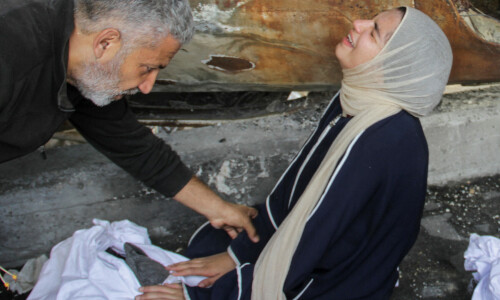OBLIVIOUS to the scorching sun, Manno sits on a charpoy under the shade of a thatched hut, her fingers deftly working on the traditional multicoloured pakhiwas sheet called rilli. The patch of shade she works in also appears to be sizzling and emitting heatwaves of its own. There are beads of perspiration running down Manno’s face. Because of constant exposure to the merciless sun, her face, forearms and hands appear dry. Her parched appearance adds years to her actual age. She doesn’t know when she was born, nor can she remember the date of birth of 12 of her children who encircle her; most of them without clothes or only partially clad. Flies hover over their faces.
What Manno does remember is that she was married off soon after she had her first period. When her parents realised she had reached puberty, she was handed over to the man who was meant to be her husband. Since then, she has given birth almost every year.
Two decades ago, her clan, devastated by flash floods in a remote village in the kutcha (riverbed) area of Muzaffargarh, migrated to the higher grounds of Chakwal district and built their huts near an abandoned railway track.
All Manno’s friends and cousins have children almost every year; nearly all of them are mothers of a dozen children. But none are documented in government records. Like Manno and her friends and cousins, there are thousands and thousands of nomads who keep changing their location in accordance with their tradition.
These nomads or gypsies are called tapriwas or oddhs in our society, and the government refuses to issue them with national identity cards (CNICs) because they don’t have a ‘permanent address’.
According to the NGO Grass-root Organisation for Development of Human-being (Godh), which is working on issues related to Pakistan’s nomad population, there are around 15 million people in the country who are constantly on the move and whose existence is not part of the government’s records. They are denied jobs, education and health facilities. Most of the adults among them spend their lives working as labourers on construction sites; the children beg or are scavengers.
“The government doesn’t provide them with identity cards, nor their children with birth certificates because a permanent address is a prerequisite for these documents,” says Nazir Ahmed Ghazi, executive director of Godh. “And the CNIC is a primary requirement for accessing basic facilities such as health, education, jobs, etc.”
Gulab Mian, in his late 20s, lives in another nomad slum close to Manno’s hut. His parents died — unregistered — when he was still a young child.
Mian now needs an identity card for a job and to prove his nationality to avoid police harassment at checkpoints. But the National Database and Registration Authority (Nadra) has refused to give him a card and demands the registration documents of his parents, which were never there.
“There was no custom of registration in our community so my parents, or for that matter, grandparents or great grandparents never got themselves registered. Meanwhile, the government also never made any effort to reach out and devise a formula to count them as part of the national population,” explains Mian. “Now when I approach them to register myself, they demand my parents’ documents; they died years ago, so what can I do now?”
According to Ghazi, Mian and thousands of other people from his community are the most vulnerable in the country and the state has been meting out shoddy treatment to them.
A Nadra spokesman did not offer any comments but a ruling party member of the National Assembly’s Standing Committee on Interior Affairs Shahid Hussain Bhatti said that the issue needs to be addressed like many other tricky matters being dealt with by the government.
But senior journalist Mobarik Virk calls the government’s poor handling of this problem ‘criminal negligence’.
“If the government is not providing you with an identity document, it means that it’s denying you citizenship without which you simply cease to enjoy your constitutional rights. Thus, these people are effectively prevented from access to whatever facilities are available to those living below the poverty line in the country under many schemes. And these people indeed are entitled and have a right to access,” Virk says.
He adds: “On the one hand, this government is creating a hullaballoo about the National Action Plan and re-registering Afghans and all other foreigners living in the country to keep a track of them, while on the other, it’s not counting even its own citizens, and is simply turning a blind eye to an issue which can take a nasty turn anytime. This is ridiculous.”
Meanwhile, Manno asks where she should take her children to get them registered as ‘certified Pakistanis’.
“Nadra officials say that they can’t give us identity documents because we don’t have a permanent address and we should go to some other place. I ask, where should we go? After all, we are Pakistanis,” she says. For so many like Manno, these are questions without answers.
Published in Dawn September 13th, 2016















































Dear visitor, the comments section is undergoing an overhaul and will return soon.